 | Nathaniel Hammond - Algebra - 1742 - 362 pages
...n, and _y, multiplied together. The Operations in Algebra are founded orj thefe Axioms. t AXIOM i. If equal Quantities be added to equal Quantities, the Sum of thefe Quantities will be equal. AXIOM z. If equal Quantities be taken or fubftrafled from equal Quantities, the Quantities remaining... | |
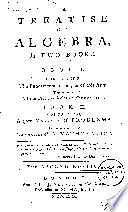 | William Emerson - Algebra - 1780 - 574 pages
...o, ? , 8, D, b, a, £, X, &c. AXIOMS. 1. If equal quantities be added to equal quantities, the fums will be equal. 2. If equal quantities be taken from equal quantities, the remainders will &e equal. 3. If equal quantities be multiplied by equal quantities, the products will... | |
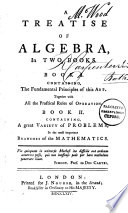 | William Emerson - Mathematics - 1764 - 582 pages
..., ? , D , b, Si, í, X , &c. AXIOMS. 1. If equal quantities be added to equal quantities, the fums will be equal. 2. If equal quantities be taken from equal quantities, the remainders will be equal. 3. If equal quantities be multiplied by equal quantities, the produits will... | |
 | Nathaniel Hammond - Algebra - 1772 - 362 pages
...multiplied together. The Operations m Algebra are founded on thefe Axioms. AXIOM i. If equal Quantities are added to equal Quantities, the Sum of thefe Quantities will be equal. AXI 0 M 2. If equal Quantities are taken or fubftracled from equal Quantities., the Quantities remaining... | |
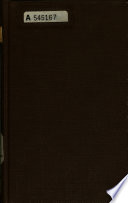 | John Bonnycastle - Algebra - 1782 - 226 pages
...for thofe that are unknown. AXIOMS. 1. If equal quantities be added to equal quantities the wholes will be equal. 2. If equal quantities be taken from equal quantities, the remainders will be equal. 3.- -If equal quantities be multiplied by equal quantities, the products... | |
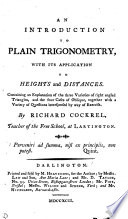 | Richard Cockrel - 1792 - 142 pages
...'* ' SECTION 2. ..., A. XIOM S. " I. TF equal Quantities be added to equal J_ Quantities, their Sums will be equal. 2. If equal Quantities be taken from equal Quantities, the Remainders will be equal. 3. If unequal Quantities be added to unequal Quantities, their Sums will... | |
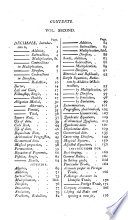 | Paul Deighan - Arithmetic - 1804 - 504 pages
...has no radical fign. Axioms* Axioms. 1. If equ.il quantities be added to equal quantities, the fums will be equal. 2. If equal quantities be taken from equal quantities the remainders will be equal. 3. If equal quantities be multiplied by equal quantities, the products will... | |
 | William Nicholson - Arts - 1819 - 432 pages
...the quantity 2 a A is deducted. AXIOMS. 1. If equal quantities be added to equal quantities, the sums will be equal. 2. If equal quantities be taken from equal quantities, the remainders will be equal 3. If equal quantities be multiplied by the same, or equal quantities, the... | |
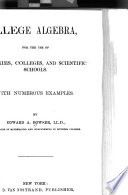 | Edward Albert Bowser - Algebra - 1888 - 868 pages
...are founded upon the following axioms : 1. If equal quantities be added to equal quantities, the sums will be equal. 2. If equal quantities be taken from equal quantities, the remainders will be equal. 3. If equal quantities be multiplied by equal quantities, the products will... | |
 | St. George Jackson Mivart - Science - 1894 - 452 pages
...the student must bear in mind, thus : i. If equal quantities be added to equal quantities, the sums will be equal. 2. If equal quantities be taken from equal quantities, the remainders will be equal. 3. If equal quantities be multiplied by the same, or equal quantities, the... | |
| |